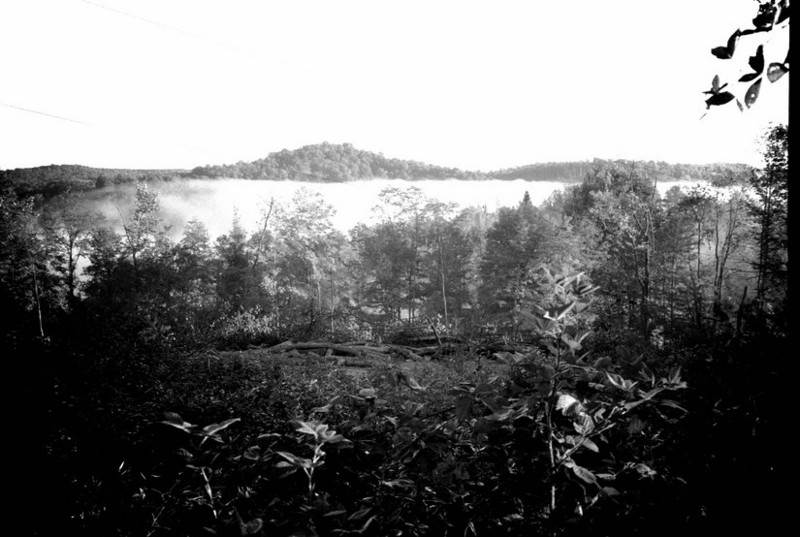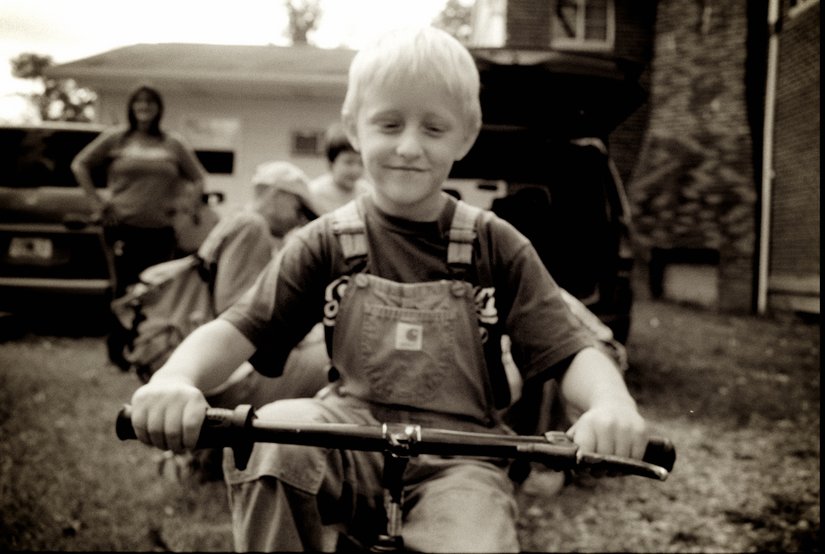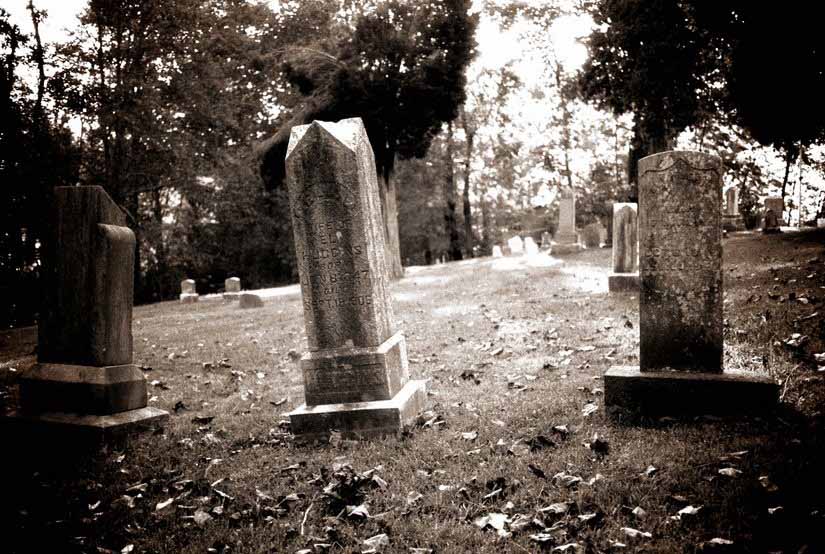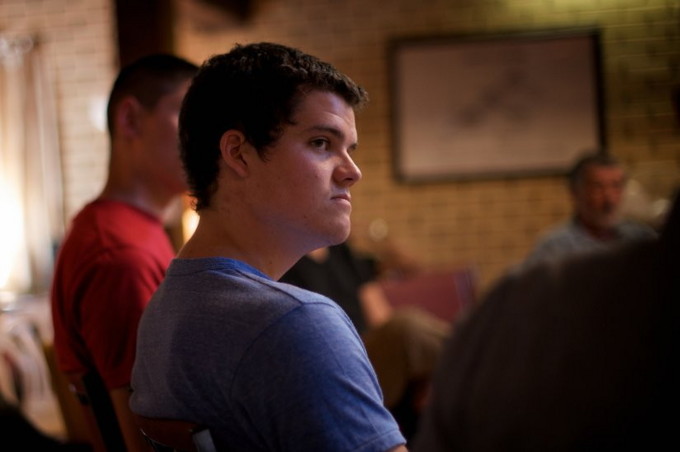September 2011
This Month's Contents: I wanted the truth... by Joseph Sadony | A Poem by Shawn Nevins| Music: Into the Wild - Rise by Eddie Vedder | Video: The Non-Event Of No Self with Tess Hughes | Portrait of a Seeker - upcoming book excerpt by David Weimer | Quotes | Humor | Reader Commentary & Answers | Question of the Month
Editor's Note
by David Weimer
Each image in this issue is from the TAT Foundation Community Building and Retreat Center near Wheeling, WV, captured by . This month's fall workshop will be the last such meeting held at Richard Rose's farm, which has seen gatherings in the spirit of self-definition and metaphysical exploration for 38 years. "All good things must end," it is said. Must they? Or merely do they?
Future TAT Foundation meetings will be held at Penn Scenic View in southwestern Pennsylvania and the Claymont Society Mansion in West Virginia's eastern panhandle. "The show must go on." Yes. In this case, Yes.
Part of this month's show is a call for poetry for next month. If you've written or read something and feel inspired to, please click on and send it with "October call for poetry" in the subject heading.
I wanted the truth...
by Joseph Sadony
"I wanted the truth to select its own words, and not for men to try to shape ideas of truth in my brain with their words. This would not be true, and it was impossible ever for it to be true; for that is not what truth is.
"Every argument that I ever heard was caused by someone trying to shape the truth by words, instead of allowing the words to be shaped by truth.
"Fervently and deeply I wanted the truth, and I could see that none of the teachers knew the truth; none of the books told the truth. It was nothing but words, and words about words. Brick by brick, word by word, I saw the wall being built around us children to seal us for life into one room of our brain, with only two windows, our eyes, safely guarded with prison bars of words stronger than steel that also kept out most of the light; with every other gate of the mind carefully sealed by a word, so that no feeling could be arrived at, save through a word first, like putting gloves on our hands, shoes on our feet, spectacles on our eyes, muffs on our ears, and a woolen padding on every nerve end so we would be cut off from the quivering, life-giving pulsations of direct contact with the truth.
"So I revolted; tore down the wall of words; threw off my shoes, both physically and mentally, and walked barefoot even where the stones were sharp and painful.
"I went on alone in rain and thunderstorms, praying to God to let me feel the truth that no one could tell me in words. I promised that if He could make me “feel” the right things to do, I would always obey those feelings, instead of what other people told me to do when one person said one thing, and another said another."
~ from Gates of the Mind, by Joseph Sadony (1877-1960)
A Poem
by Shawn Nevins
|
The world is bronzed by a setting September sun. The day’s ambitions settle among the tall, burnished grasses, and thought comes ‘round to night and endings. Evening inexorably deepens till the sun is a memory and the world a shadow of something rising deep inside.
|
Music: Into the Wild - Rise
by Eddie Vedder
If you don't see a video clip above, go directly to youtube.com
Video: The Non-Event Of No Self
Interview by Renate McNay
of TAT member
Tess Hughes
If you don't see a video clip above, go directly to youtube.com
Portrait of a Seeker
upcoming book excerpt
by David Weimer
When the Earth goes, where do we go? If we’re lucky, we catch a space cab just before the big explosion. But what if we go before the earth goes? I heard that there’s a Native American tribe—or was one—that had no word for time.
Some of our specific words relating to that thing we imagine and call time: minutes, seconds, hours, days, weeks, months, years, decades, centuries, lifetimes… Oops—that last one isn’t really in the same class as the others. Too subjective. You’re as old as you feel, the saying goes. No doubt. Some people refuse to celebrate birthdays because they see them as a conspiracy to chain them to the paradigm of getting older and dutifully dying as close to the watermark four score and twenty years (100-years-old) as a person can get. I talk occasionally with a YODELING SINGER SONGWRITER from Brooklyn, now living in Wheeling, who states with seeming certainty that he’s going to live to be 150. For him, there isn’t a hundred years from now; there’s only eighty more, then nothing. He’s in his 70s, so he’s going to miss the hundred mark by a score.
Where’s this point, that elusive point?
Maybe the universe doesn’t have a word for time. Maybe we just come and go, in a dance of motion—blooming and fading, dying, reemerging and living—an endless Mandelbrot set of existence that we sticks-in-the-mud try to pin down like the butterfly we’ve captured to be shown to others as a “thing apart.” Apart from me? You? From other “things”? What if the rest of the universe thinks that everything is everything? What if we are a part of a neuron cluster in the great brain named by us “universe”? A cluster of neurons stuck in a loop of reoccurring nightmares where creatures try, and seem to succeed, in catching time?
Richard Rose, that West Virginia guru, said that when he closed his eyes, the sun disappeared. This sounds simplistic and ridiculous at first.
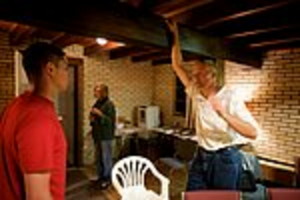 We humans make sense of our reality with our minds-senses. If we see it, it exists. If we don’t, it doesn’t, can’t, exist. This is depending on ourselves as a kind of infallible truth-teller. How can this be? When we only see, hear, feel, taste and smell a small fraction of what is seeable, feel-able, taste-able and smell-able? Can we taste space? Are we space to space? (un-taste-able to one another because of an utter difference in condition of being) What about another world, with another atmosphere? Do autistic people live in another world? Undoubtedly. Which of our worlds is “right”? We imagine and assume so much. I know this can go on to apparent absurdity, but this is the territory that a serious philosopher—a lover of wisdom—eventually will find himself or herself encountering at some point. Questioning our very selves and everything we rest on and within. Why don’t we talk to the air? Question it? Do fish ever consider the water they’re swimming in? Can they even notice it? What about our thinking? It is our mental water—very comfortable and apparently known. But can we ever know anything else, as long as we’re in our fishbowl?
We humans make sense of our reality with our minds-senses. If we see it, it exists. If we don’t, it doesn’t, can’t, exist. This is depending on ourselves as a kind of infallible truth-teller. How can this be? When we only see, hear, feel, taste and smell a small fraction of what is seeable, feel-able, taste-able and smell-able? Can we taste space? Are we space to space? (un-taste-able to one another because of an utter difference in condition of being) What about another world, with another atmosphere? Do autistic people live in another world? Undoubtedly. Which of our worlds is “right”? We imagine and assume so much. I know this can go on to apparent absurdity, but this is the territory that a serious philosopher—a lover of wisdom—eventually will find himself or herself encountering at some point. Questioning our very selves and everything we rest on and within. Why don’t we talk to the air? Question it? Do fish ever consider the water they’re swimming in? Can they even notice it? What about our thinking? It is our mental water—very comfortable and apparently known. But can we ever know anything else, as long as we’re in our fishbowl?
When ‘ordinary’ people—by that, I mean part-time philosophers—get to a point like this, they generally become nihilists and declare that “all is relative,” the exact nature of the universe is unknowable (un-pin-able) and that God is, in fact, dead. They possibly become more sure (or unsure) of this position as time goes on and repeat it as often as possible for the rest of their lives. But do they know this? You know, the old question—did people a thousand years ago believe that the world was flat or know it was flat. I bet that some of them knew it deep in their assuming. Just as people nowadays “know” beyond any creeping uncertainty that there is no answer, no permanence, and no all-encompassing comprehension of everything to ever be experienced first-hand. They’ve bricked up a grand entrance.
Another category of folks consists of full-time believers who’ve also diligently and incrementally worked toward a total commitment state of certitude. Maybe they had a wobbly moment in there, but they’ve grown sure and now feel more stable than ever on their feet. They are right, of course. Most others are sadly wrong and misguided. These people, though, are not plagued by doubt any more and will be able to live their lives inside a feeling of great personal purpose they share with some others. They’ll try to encourage as many lost souls as possible to share in this revelation, and pray for the ones who won’t see their errors. They’ll possibly die secure. Hopefully. I’m guessing, as everyone must do who is looking at something from a distance instead of thinking from inside of it.
DOUGLAS ADAMS seemed to take pleasure in highlighting and ridiculing people’s pet beliefs, obsessions and attachments. He seemed to take nothing seriously, but probably took everything extremely seriously. I feel a refreshing lack of judgment in his writing; he considers all with equanimity. All are fools. Some are wise. I don’t know what his personal life was like. I don’t know if he was content. I don’t know what his view of the universe was. Or… maybe...
Can you know an animal by its footprints? Can you know me by mine? Where do my words come from? From the essential me, the mercurial me, the 'me' of the moment? From some annoyed, saddened, gladdened, or maddened aspect of me? Probably yes to all. A running animal leaves tracks spaced far apart. A confused animal leaves circles of footprints spiraling and weaving. A hurt animal pauses often… Same animal leaving different prints. So—can we know something of a total person, the essential person by looking at tracks on a page? Is a composite-person now asking you questions? A multiple-personality self? A fundamental I-ness? Essential me? I feel something essential. Even detect it permeating into my personality. I feel this person speaking now has a voice that he’s writing with…
I feel a lot more than the words I use, and I know others do, too. A portrait of words is convenient, because it doesn’t need to make sense in its particulars to convey something in its totality.
It could be like a mirror. I look in the mirror, often not too closely, but only see an opposite-person as daily companion, never the actual me, because I can’t step outside of me to look directly at me. In the mirror, my hair is parted on this side, but it’s really parted on that, as everybody else “knows.” My scar, here, is really on the other side. So, with this book, a reader of my words will see what my mindless servant feet have done—obeying vague, arbitrary commands sent from the “head office”—but they’ll never “know” what it feels like to be me. They’ll feel it, if anything.
We’re all a book. Most of them get thrown into the hole unwritten. Big, thick books of years and years of memories and experiences—down with the ship and no survivors. I watched my dad’s parents die, their books largely unopened. One day, driving back from the hospital where my grandmother lie dying, my grandfather Harry, a stern man of few reflective words, made a passing comment about some fields we were driving by in the fall dusk. “I worked those fields,” he said. I’d assumed out loud that it was with the tractor I knew he’d used for years. “No!” he said, dismissively. “With mules; later on with the Farmall.”
I heard those hours and hours of solitary hours spent under sun and rain and days and days in his voice, his tone, his look out the car window. But he said nothing more. Years later, recovering in a nursing home after having broken his femur in a fall, nearing his ninetieth birthday and years after his wife’s eventual death, he repeated to me, as if it were a particularly revealing revelation, “I never thought I would end up here. I never thought it’d be like this.” I think that when the end of our lives comes or is nearing (nearing the last stop on the train line), we’re possibly too occupied in the business at hand to be ‘reflective’ about ourselves and our lives. So, the book gets chucked into the hole with us, to land on our folded hands, unopened. We’re all a book—beginning middle and end—and most are never read.
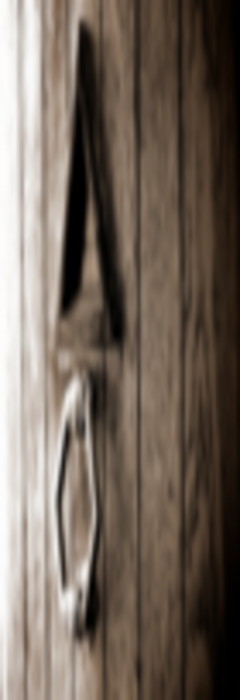
|
Quotes...."I maintain that everybody wants to know the truth. This is a broad term – we hear it so much – it sounds like you’re talking about somebody who wants a hamburger and they want the truth also. But I maintain that the very nature of man is curious; that the curiosity in rooted in his search for meaning. Viktor Frankl once said that the purpose of man’s drive was the will to meaning. Of course after I got done reading his book I found out he meant a different type of meaning. But nevertheless, he was the first psychologist who came forward and announced that the main drive in man was to find his meaning. Most of them thought that our lives were for pleasure, or our lives were for power, such as Adler. Freud’s view was pretty much that we were sexually motivated. I maintain that everybody wants to know. But you talk to different people and you’ll get different answers. A lot of them, the more material scientists, or those who lean toward material science, may tell you that when you die you enter oblivion and your electrons go back to the atmosphere or back to the earth, and that’s the end of you. Because it’s easier to think that, than it is to speculate on numerous concepts, the years of research that have been done by spiritual or religious or philosophic groups. There are some people of course who say that we’re just animals. And others say we are animals that have souls. Now I can almost talk to a person more easily if he thinks we’re an animal with no soul, than I can with a person who thinks we have a soul, or who believes that we have a soul. Because the majority of them don’t bother to prove it; they rest on faith – and the great democratic theme, that where everyone’s going, that’s where they’re going. And they don’t really feel secure in that, but it’s the rationale that gets them from one crisis to another." ~ Richard Rose, Kent State University, April 12, 1978.
|
Humor....
He will drag you down
to his level
and beat you with experience.
Reader Commentary
&
Question of the Month replies
TAT Foundation Office,
Please keep up the Question and Answer section for it is fun and interesting to read the variety of answers that come forth regarding the question of the month.
It's like you allow us a "talk among yourselves" time.
~ Nianza
Somewhere in my many readings I recall Rose addressing this very question. His reply was given with quiet, intense conviction. This is grossly paraphrased but here goes: "If there were nothing after, if it were just empty, I wouldn't bother with all this work."
As for my own experience, I was always seeking anyway. Prior to this I was seeking happiness, meaning, etc. When this search failed repeatedly I became angry enough and another type of seeking began: to know what the hell was going on. In retrospect both were equally "not mine", so again that question: Do we really choose?
If we do, I would encourage one to seek based on Rose's above words. If we do not and yet you still insist on asking yourself this question, it's not yours to answer anyway.
~ Sheri
Dear Sirs
Seek to find something
That something is depend on Individual
So endless seek
The TRUTH is nothing to seek
Find out WHO YOU ARE
NOBODY CAN TELL YOU THAT
You have to find out for your self
So all seeking come to an end
With Love
~ Tarma
If someone asked me, "Why seek?" I would nod in apparent agreement and give them
my silent blessing. They seem satisfied by a world I find meaningless. So?
So I wouldn't wish my dissatisfaction on them, or my yearning for something
final and real. You have to need to take the red pill (which
will wake you up from the pod dream). "Ignorance is bliss," said Cypher in The Matrix, preferring the dream and a great steak over reality. Right on.
~ M.S.
Dear TAT Forum editors,
I'm sending my contribution to the question: "Why Seek?"
A: This is a question that should be directed solely to oneself. In fact, it is difficult for me to see how the question even arose. If you know something is missing, you will immediately seek without even asking why. But if nothing is missing, then yes, why seek? Seeking the answer from someone else implies relying on outside authority to tell you what to do with your life. Not only it is immaturely irresponsible, it is also absurd.
Yours sincerely,
~ Ike
Hi,
For me the whole search is driven by a feeling, a feeling of something missing. It started out as this feeling in the chest, as this - vacuum. Now it is more of a background feeling of emptiness, that seems to be produced by the awareness that is always there.
This is stuff that a lot of people have heard or can relate to I believe. I also think that a lot of people have this sensation but just do not know it.
I also believe that such a question cannot lead to much helpful answers before the person himself feels the feeling or even admits the importance of it.
I get the feeling that this whole question springs from a desperation that is created when the intellect cannot grasp the feeling and achieve certainty. From an unwillingness to accept the meaning of it, maybe in the form of an ongoing intellectualisation that never brings anything that would explain that feeling logically. Or maybe from a certain cockiness, from a defiant attitude that is a result of a belief that one is better than the rest. Maybe even from a desire to try to hide that fact from oneself.
But still after what I have said, I get a strong conviction that the whole question springs from that feeling itself and is like a call for help. And the funny thing is that it springs from the same source it is itself trying to deny and forget! No wonder there is no way out.
So I guess that we really have no choice in the matter. Whether we admit it or not we are always seeking, when we say we are not, we are living in denial.
~ Anonymous
And...
this month's Question:
Take your pick (or answer both)
1) What do you know for sure? [from Richard Rose's Lecture of Questions.]
Or
2) What do you want to know for sure?
Write your answer on the back of a twenty dollar bill and send it to us at: .
Did you enjoy the Forum? Then buy the book!
Beyond Mind, Beyond Death
is available at Amazon.com.


